Gettysburg's Cory Weissman overcomes odds to return to the court one more time.
GETTYSBURG, Pa. -- Even two weeks later, the moment, for those privileged enough to behold it, still blazes in the mind's eye.
Cory Weissman, with the cockiness you would expect of a New Jersey point guard, stares down the rim from the free-throw line. He touches his white Gettysburg College shorts just above the right knee, then tosses the basketball upward and a little forward with an almost unconscious wrist motion he has practiced thousands of times. Like a magic trick, it jumps back into his hands. He bounces the ball three times, flips the ball again, then cocks and releases it with his right hand. Few notice that both of his size-10 Nike Hyperfuse shoes are an inch or two off the floor, a clear breach of free-throw etiquette, but he knows he needs a little something extra.
An awkward hush has fallen over Bream Gymnasium; some spectators are clasping their hands in prayer or pressing them to their hearts. All eyes are on the ball, floating above the court, rotating three, four, five times as it begins to descend. Everyone -- even the five Washington College players -- finds themselves trying to will it into the basket. The conflicted look on Weissman's face reveals what is at stake. His teeth are bared, clenched in a grimace, but his hazel eyes are already dissolving into something joyous -- even before the ball swishes through the net.
[+] Enlarge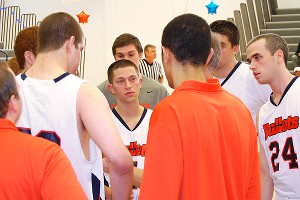

Courtesy of Tommy RiggsFinding his way back to the court was part of the healing process for Cory Weissman.
Weissman scored 1,071 points at Jackson Memorial High School, but he will tell you that this one was far sweeter than any of them. This was no mere free throw. Hardly. This one was dearly, dearly bought.
It was the first and only point of his college career, and it came on Feb. 11 near the end of an otherwise meaningless Division III game. But the extraordinary circumstances that conspired to deliver Weissman to the line on Gettysburg's Senior Day slowly seeped beyond the modest radius of the Centennial Conference, a case of Lin-sanity Lite. Another scrappy point guard thrust from obscurity into a very public arena.
A same-day local television feature blossomed into compelling reports by D3Sports.com, Yahoo! Sports and the Baltimore Sun. This week, Weissman was featured in Sports Illustrated's Faces in the Crowd and Frank Deford featured Weissman's story in his weekly segment on NPR's "Morning Edition." The backstory of Weissman's dramatic return to the court after a harrowing setback, colliding with a rare, stellar act of sportsmanship -- well, to be honest, it read more like fiction.
"No," he said, "it didn't feel real, and it still doesn't. It feels like it's a storybook, like a Disney movie."
That fearless free throw was No. 10 on ESPN SportsCenter's Top 10 Plays last Thursday. "Hey," Weissman asked, smiling, "why wasn't it No. 1?"
No one can ever know the full extent of Weissman's courage, his perseverance in private moments when seizures wracked his body. But shake his hand, sit down and talk with him, and you begin to get an idea. When you are 5-foot-10 (maybe), 160 pounds, controlling the flow in a sport in which almost everyone is bigger, you learn to compensate with steel and swagger. Sometimes, even when you really aren't feeling it.
"Do you have your cell phone on you?" Weissman asked a reporter last week.
"I do," came the reply.
"Do you have Erin Andrews' number?"
Touch and go
They were lifting weights after an offseason workout when Weissman's left arm went numb. A severe headache swiftly followed and fellow freshman Brendan Trelease helped steer him toward the trainer's room.
"He couldn't keep his head up, it was kind of bouncing from side to side," Trelease remembered. "I ran ahead to get help and in the five seconds that I wasn't with him, the left side of his body was completely paralyzed."
When the training staff asked Cory to smile, only the right side of his mouth turned up. Although he was only 18-years-old and exceptionally fit, assistant athletic trainer Katie Whaley knew Weissman was having a stroke. What they didn't know: Since before birth he had an arteriovenous malformation (AVM) on the right side of his brain, an irregular tangle of arteries and veins that burst that day, March 26, 2009.
"At some point between the ages of 15 and 20, it shows itself," Whaley explained. "With someone that has a hemorrhage, normally 50 percent of those people have lifelong disabilities of some sort. There's a 50 percent mortality rate, so it was pretty alarming."
The protocol was to airlift him to Milton S. Hershey Medical Center, but heavy rains eliminated that option. Weissman, his condition worsening, traveled those frenetic 50 miles by ambulance. Basketball coach George Petrie arrived at the hospital ahead of Weissman's parents, who were driving from New Jersey.
"Their biggest concern was pressure on the brain," said Petrie, who spent the first three days there. "They would not let him sleep. It was building up, and it was touch and go."
[+] Enlarge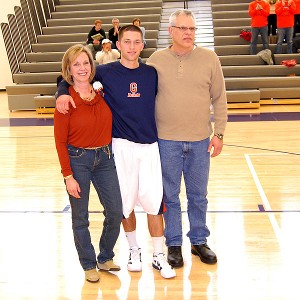

Courtesy of Tommy RiggsHis parents, Tina and Marc, have been with Cory every step of the way.
An embolization procedure on his second day there stopped the bleeding, and Weismann's condition eventually was upgraded to stable. But on the third day, he was rushed for an emergency CAT scan when one of his pupils dilated and the other constricted.
"It was the hour that stood still," said his older brother Jeremy, a tear in his eye. "You just sit there and pray that it should work out, and hope that it does."
The danger passed, and he was released from Hershey after 11 days, then taken by ambulance directly to the Kessler Institute for Rehabilitation in West Orange, N.J. His left side was still non-functional; he couldn't walk or control his left arm. Jeremy, who had driven immediately to Hershey from the University of Maryland, was appalled at Cory's vulnerable condition. But early on at Kessler, he said he was going to dog Cory all summer, drag him through every drill imaginable, every treatment necessary to get him back on the court. It was, Cory said later, the first time he believed it might happen.
Five weeks at Kessler brought his arm back; he spent a lot of time dribbling a basketball to get the feeling back. He was still having trouble walking and struggling with short-term memory loss when he returned to Hershey for a seven-hour operation on June 1 that removed the AVM.
Weissman, good on his feet and lights-out quick, was an all-state soccer player, but his leading love was always basketball. When high school friends and teammates gave him an autographed Nike basketball three days into his stay at Hershey, he cradled it with his good arm and it rarely left his bed. On the third day at Kessler, his mother, Tina, a physical therapist, rolled him to the outdoor patio. He got out of his wheelchair, leaned heavily against her, braced himself with his left arm and hoisted a few short, weak right-handed shots at the 8-foot hoop.
"It wasn't a full-height basket by any means," Tina said, "but I knew that's what he needed to do to see himself as himself."
It became a daily routine, with Tina, Jeremy and father Marc, taking turns propping him up. Sometimes, when those shots went in, he'd smile.
"I've still got it," he'd tell them.
Mostly, though, he was telling himself.
Incremental steps
Not everyone was certain that returning to Gettysburg in the fall of 2009, even with a lighter course load, was such a good idea -- his mother, for instance. Cory, always balls to the wall, didn't want to hear it.
When the seizures began, he convinced himself that he still wanted -- no, needed -- to be part of the Gettysburg basketball team.
"I would get a weird sensation in my left hand," he said. "Then my arm would start to shake and I would get tremors in my bicep and it would just start shaking out of control."
It was gruesome to watch, but his teammate Brendan Trelease learned to help Weissman to the floor, put something under his head, try to get him as comfortable as possible and ride it out for a minute or more. It is a measure of their friendship that of the dozen or so seizures Weissman suffered in the two years after surgery, Trelease was with him for seven or eight.
"Every time I had one, it was a punch in the stomach," said Weissman, who reminded himself it was a necessary part of the healing process. "But like everything else, I said it wasn't going to beat me. I would get through it."
Seven years earlier, he had overcome a severe injury. During a soccer game he suffered a spiral fracture of the tibia and spent three months in a full cast. Sooner than the doctors thought, he was playing AAU basketball.
It was fortuitous that Gettysburg was in the process of rebuilding its new athletic facility. One of the showpieces is the HydroWorx 600 therapy pool with an underwater treadmill. Weissman spent hours hammering it. He was encouraged by the experience of University of Connecticut guard A.J. Price, who had suffered a stroke as a result of an AVM -- and gone on to play with the Indiana Pacers. He chose not to dwell on the fact that Price was lucky; his AVM was in a different part of the brain and did not permanently affect his motor controls.
Even though he was unable to keep up with friends by walking to class, Weissman told his coach his goal as a sophomore was to return to the basketball court, that he'd be the hardest-working player on the scout team. He talked about dressing and talking part in the pregame layup drills.
"I said to him, 'Take some time and get your school work done, take care of your body,' " Petrie said. "He said no, that he'd feel like he was letting his teammates down."
Petrie let him operate the clock during practice, something he did from a sitting position behind a table at midcourt.
A simple solution
When Weissman arrived at the hospital in Hershey, they cut a faded black T-shirt off his limp body.
It was a symbol of his high school athletic accomplishments, a shirt he was given to play in a flag football game against the faculty. On the back, he had written: "Mr. 1000" to commemorate his four-digit scoring total in basketball.
[+] Enlarge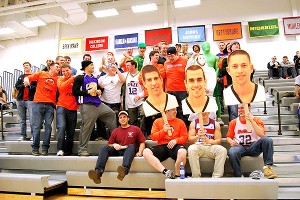

Courtesy of Tommy RiggsFans at Bream Gymnasium got caught up in Weissman's remarkable story.
Said Weissman, "They cut the shirt off and it was like I am no longer that person. I have to change to a new person."
Last Feb. 26, Weissman's 21st birthday, Trelease presented him with a gift. With the help of Tina Weissman, he recreated that old black shirt.
"He's very good at setting goals," Trelease said. "His first goal was to dress, the next one was to participate in warm-ups. He accomplished both of those things this year. The third and final goal was to get on the court in some way."
This proved to be the most difficult. Cory was voted one of three captains by his Bullets teammates, who were inspired by the effort he threw into his comeback and the encouragement he always offered. He had been cleared for contact by doctors, but the coaching staff struggled with a plan to acknowledge him in a safe and responsible way. The day before the game, Petrie, the brother of former NBA star and current Sacramento Kings president Geoff Petrie, reached out to Washington College coach Rob Nugent through assistant coach Stuart Pradia, a one-time Washington assistant.
When Nugent offered a simple solution, Petrie immediately called captain Tim Lang.
"Where's Cory?" Petrie asked. "Well, find him and tell him he's starting tomorrow."
After receiving the news, Weissman said he was in shock. He walked back to his apartment. After a few minutes it hit him. He started sobbing, and didn't stop for more than 20 minutes.
Weissman -- he was so nervous he couldn't pin the Senior Day corsage on his mother's orange blouse -- was announced as a starter and bounded a little awkwardly onto the court for the opening tip. The gym, intimately aware of his journey, was primed. Students chanted his name and a few frat boys waved blown-up photos of his head on sticks. A number of spectators -- not just his parents -- wept.
"Cory got the ball and he rolled it out of bounds, checked out," Nugent said. "You thought that was the end of the Cory Weissman story on Senior Day, for sure."
Said Weissman, "I finally achieved my goal. I was happy. My day was perfect."
A touching gesture
A month earlier, Gettysburg had lost to Washington in overtime; one scenario Petrie did not foresee in the rematch was an 18-point lead with less than a minute to play.
"Cory, you want to go in?" Petrie asked, wondering if he was pushing his luck.
"You kidding me?" Weissman answered, jumping off the bench and pulling off his warm-ups before Petrie changed his mind.
Weissman entered the game with 52 seconds remaining. After Washington scored a basket to make it 83-69, Nugent, inexplicably, called a timeout. With 19 seconds left, he had a lovely idea.
As he told his players to foul Weissman -- gently, without hurting him -- an assistant made a fouling motion to the Gettysburg bench. Petrie nodded, deeply touched by the gesture of sportsmanship, and told his players to get the ball to No. 3.
"Sending Cory to the free-throw line, making him earn that in front of a large crowd -- you don't get this much in sports," Nugent said later. "Everybody in the gym is rooting for him to make it. That's a lot of pressure for a young man who hasn't played."
Washington freshman forward Sean Flanigan was guarding Weissman.
"He gets the ball, and I just tug on his jersey, just the slightest tug," Flanigan said, beaming. "You just hear the whistle blow … it was nice."
In the stands, Tina Weissman did the math.
"Oh, my gosh," she thought, "he's going to the line. We're in the double-bonus! He has two shots here!"
Weissman played in three varsity games as a freshman, but never scored. Here, with 16 seconds left in the fourth and final game of his Gettysburg career, was a chance to change that. It's funny, because when the Bullets shoot free throws after practice, Weissman usually misses the first one -- short.
[+] Enlarge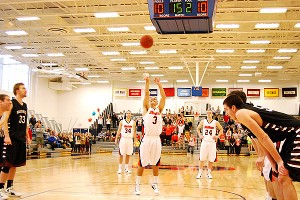

Courtesy of Tommy RiggsThis free throw, Weissman's only point, brought everyone in the gym to their feet on Feb. 11.
"Then he'll make the next 10 or 12 after that," Trelease said. "I'm sitting there before his first free throw thinking it's OK if he's short, that it's a really good sign the next one is going in."
Sure enough, the ball barely grazed the left front of the rim.
"I never heard a place get so quiet so quickly," Petrie said.
Said Flanigan, "It wasn't pretty. I'm just sitting there on the line like, 'He better make this next one.' "
Weissman felt the same way.
"For whatever reason," he said, "the second free throw was the most confident free throw I've ever taken in my life. I saw three years of hard work flash before my eyes and said there's no way this ball's not going in."
Like Weissman and everyone else present, Petrie felt relief.
"When that ball went through it was like an explosion of sound that just resonated, and I think everybody had a good cry," the coach said. "It was just great. Great."
And then, on a day of sincere gestures, Petrie produced another. In his 23rd season, he had just won his 322nd game, passing Hen Bream for first on the all-time Gettysburg basketball list. The game ball was rightly his, and it was tucked inside his elbow as he walked off the court.
"Hey," he said, turning to Cory. "This is yours."
The sky's the limit
How to quantify all the hard work, the belief required to pull this thing off?
Look no further than the top of Weissman's head. A jagged, ugly scar -- a remnant of that seven-hour procedure when doctors cut open his scalp and skull and reached into his brain -- sweeps around in the shape of a C.
"Well," said Weissman, in wise-guy mode, "my name is Cory."
The way the Washington game played out, he said, made Feb. 11 the best day of his life.
The 11-14 Gettysburg Bullets, it should be noted, suffered their first losing season in 15 years. But the program that has reached five NCAA Division III tournaments and won three Centennial Conference championships -- most recently in Weissman's freshman season -- has never felt quite so good about itself.
Washington College named him an honorary Shoreman of the Week. Head coach Rob Nugent told everyone he was surprised by all the attention.
[+] Enlarge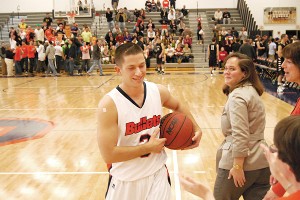

Courtesy of Tommy RiggsThanks to the thoughtful gesture of his coach, Weissman walked away with the game ball.
"It's a little humbling, to be honest with you," Nugent said. "We'd do it all over again. Take the cameras away, take the lights away, no one ever hears about it. You do it all over again.
"The story is Cory Weissman and everything he's come back from. The message is, do the right thing."
It's clear the stroke has created some permanent damage. While Cory usually was able to participate in the shooting drills for the first 20 minutes of practice, he retreated to the sidelines when serious contact ensued. Running down the court, there is only a slight hitch in his step, almost a hop. Walking, however, with his rigid left leg trailing noticeably behind, it is more obvious.
He is on track to graduate in December, appropriately, with a degree in health science. Weissman said he wants to follow his mother and Katie Whaley in a career as a physical trainer. They both believe his journey and the empathy it taught him will make him a good one.
Ask Cory Weissman where he is physically and he gives you two numbers. As a college athlete, he said, he's probably at 70 percent. As a normal human being, he's closer to 90 percent. He concedes there are two things he can't do. Running up a flight of stairs is one, driving his father Marc's standard-shift Acura is the other.
"I'll never let a doctor or a therapist tell me how much better I can get," Weissman said. "One of my favorite quotes is 'Nothing works unless you do,' and I live my life by that. To me, the sky is the limit."
His next goal?
"When I'm older," Weissman said, "I want to play in a men's league."
Greg Garber is a senior writer for ESPN.com.


No comments:
Post a Comment